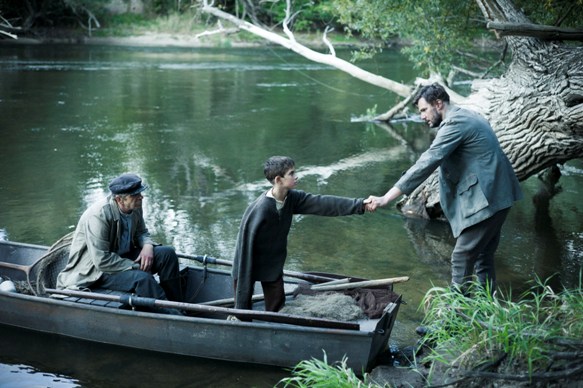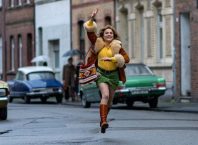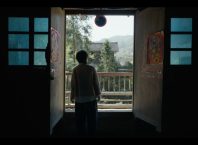Holocaust Remembrance Day is almost over as I write these words. The moment of community silence and remembrance has passed, the ceremonies with their memories, stories and songs are done. Yet as the day wanes, I think of all those who lived through that time, all those who lost family, friends and loved ones, all those for whom Holocaust Remembrance Day is every day.
Those of us who come to learn about the Holocaust from a distance, acquire a knowledge mediated mostly through books and film, relying on documents and even more so, on the testimony of survivors. The farther removed we are in time, the more critical the question becomes: how should this knowledge be transmitted? How to remember?
This year much of the discussion, in the media and casual conversation, has centered around the question of children: at what age should children begin to learn about the Holocaust, and how does one approach this painful subject with young children? Like many others, since reading of the proposition to include the Holocaust as part of the preschool curriculum, I have been thinking about this question with much anxiety and anger. Whether or not this was indeed the proposal (there are several different versions in the media), my instinctive response is to feel that children should not be burdened with such a harrowing story of cruelty and suffering.

It was with these thoughts and feelings that I saw Pepe Danquart’s film Run Boy Run, based on the novel by Uri Orlev. The book and film are based on the true story of Yoram Friedman, who survived the war on his own as a young child.
In the film, Srulik (played by twins Andrzej and Kamil Tkacz) is a eight year old Jewish boy who has escaped from the Warsaw Ghetto and is trying to survive in Nazi occupied Poland. Danquart has chosen to present this story with the utmost simplicity. The narrative is told from a perspective on young Srulik, that is close, yet never presumes to reflect his inner experiences or comment.
One first sees Srulik asleep in the snow, sheltered by a fallen tree, then trudging alone through the vast, white landscape. He sees a farmer chopping wood, the farmer’s jacket tossed aside in the heat of the work. Srulik runs in to steal the jacket, but the farmer catches him in the act and beats him mightily. “I’m not done with you,” the farmer warns, and goes into the barn to fetch some rope. Srulik seizes the opportunity to grab the jacket and run.
One is not told much about Srulik and his life before the war, the film shows his life as a boy on the run, learning how to survive day by day, learning about life the hard way. He has gone out into the world armed only with his father’s instructions: you must be strong, you must survive. Plunged into a situation in which he has no real options, Srulik demonstrates an amazing resilience. He may be sad, angry or bewildered at times, he makes blunders, yet no matter what happens: he does not give up.

He meets many people along the way: a group of children like himself, orphans traveling in a pack, who teach him some necessary skills; Magda (Elisabeth Duda), a devout Catholic who teaches him how to disguise himself as a Christian orphan and seek work on farms; there is an ambiguous encounter with a Nazi officer (Rainer Bock) and his Polish girlfriend (Jeanette Hain); a brief encounter with a group of partisans, and even a few intervals of something that might be called contentment with farming families who not only give him work, but treat him with warmth and affection.
Forced to contend with constant danger, Srulik bears the responsibility of an adult, yet he is a child. Somewhere along the way he adopts a stray dog, plays football with the local boys, and in a short amusing sequence towards the latter part of the film, tells a few tall tales to the astonishment of his hosts. Considering his circumstances, it is a wonder that he survived. It confounds the imagination to think of an 8 year old boy surviving on his own through even a single winter in Poland, much less one who is hunted down by Nazis. Some of the hardships he endured are unspeakably horrifying and cruel. There were one or two scenes when I just wanted to look away from the screen. The real-life “Srulik” did not have the privilege of choosing to look away.
Children should not be burdened with such a harrowing story of cruelty and suffering. No child anywhere should have to endure anything like what Yoram Friedman and so many other children endured in the Holocaust. As we grapple with the questions – how to remember, when and what to tell the children in our lives, films like this will become an integral and essential part of the story. A story that reminds us of the deadly power of hatred and prejudice, a story that reminds us that these events – as difficult as they may be to comprehend – really did happen, a story that reminds us that children too can be very strong, and that hope and kindness go a long way towards making the world a better place.
Run Boy Run will be shown in Israeli theatres from May 1, 2014.
Run Boy Run (Germany/Poland/France, 112 min, 2013)
Directed by Pepe Danquart; Screenplay: Heinrich Hadding, based on the novel by Uri Orlev; Cinemathography: Daniel Gottschalk; Editor: Richard Marizy; Music: Stéphane Moucha; Cast: Andrzej and Kamil Tkacz, Elisabeth Duda, Jeanette Hain, Itay Tiran, Rainer Bock.






Where can I buy the DVD?
Comments are closed.